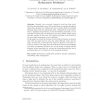Free Online Productivity Tools
i2Speak
i2Symbol
i2OCR
iTex2Img
iWeb2Print
iWeb2Shot
i2Type
iPdf2Split
iPdf2Merge
i2Bopomofo
i2Arabic
i2Style
i2Image
i2PDF
iLatex2Rtf
Sci2ools
115
click to vote
ATMOS
2008
2008
Dynamic Algorithms for Recoverable Robustness Problems
Abstract. Recently, the recoverable robustness model has been introduced in the optimization area. This model allows to consider disruptions (input data changes) in a unified way, that is, during both the strategic planning phase and the operational phase. Although the model represents a significant improvement, it has the following drawback: we are typically not facing only one disruption, but many of them might appear one after another. In this case, the solutions provided in the context of the recoverable robustness are not satisfying. In this paper we extend the concept of recoverable robustness to deal not only with one single recovery step, but with arbitrarily many recovery steps. To this aim, we introduce the notion of dynamic recoverable robustness problems. We apply the new model in the context of timetabling and delay management problems. We are interested in finding efficient dynamic robust algorithms for solving the timetabling problem and in evaluating the price of robust...
ATMOS 2008 | Dynamic Recoverable Robustness | Optimization | Recoverable Robustness | Recoverable Robustness Model |
Related Content
| Added | 26 Oct 2010 |
| Updated | 26 Oct 2010 |
| Type | Conference |
| Year | 2008 |
| Where | ATMOS |
| Authors | Serafino Cicerone, Gabriele Di Stefano, Michael Schachtebeck, Anita Schöbel |
Comments (0)

